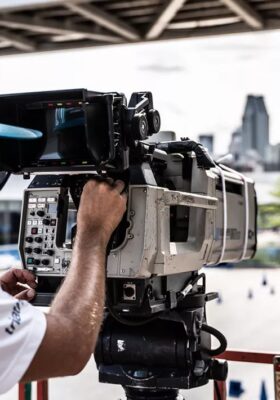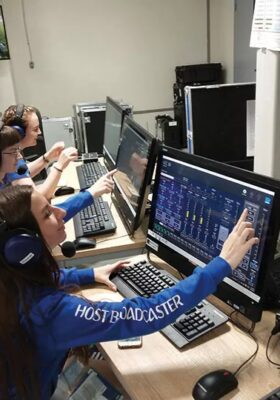
Tailormade Courses
UNESCO
HBS is partnering with UNESCO to bring two new courses to help shape the future of sports broadcasting:
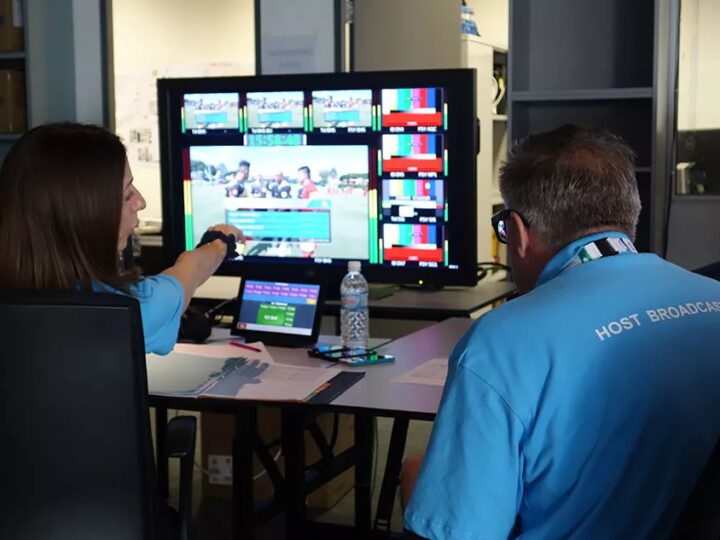
COURSE:
An Introduction to Gender Transformative Sports Broadcasting
This introductory course on gender and sports broadcasting is aimed at production teams, including directors, senior producers and reporters. This is a theoretical course designed to encourage and develop gender transformative policies in content and production of sports broadcasting, considering the business case behind including gender policies in operational activities.
Learning objectives
Theory
By the end of the course, participants will:
- Understand the definition of gender terms in a sports broadcasting context
- Be better equipped to avoid or neutralise stereotypes of masculinity and femininity in sports broadcasting
- Consider ways in which the organisation may implement a procedure of checking for/eliminating gender based stereotypes in its editorial content, commercial messages/advertising
- Understand why gender should be equally represented amongst sources and experts cited, and the need to have a database of contacts of women news sources and women experts
- Consider the business case for gender transformative polices in sports broadcasting
Practical
By the end of the course the participants will be able to:
- Pass on the knowledge gained to their peers, including board members and senior management
- Analyse news articles, photos, comments from a gendered perspective
- Use tools supplied to self-assess their editorial content for gender bias
- Think critically about how women and men are portrayed, particularly in prime time
- Assess to what extent their broadcasts are challenging or reinforcing stereotypes
- Assess to what extent women and men are depicted as making contributions, decisions or victimised in sports broadcasting
Course Duration: 1 day
Maximum Attendee Number: 30
Attendees: Board Members, Senior Management, Directors, Producers, Reporters, Presenters and Journalists.
Note:
This is a joint project between UNESCO and HBS Broadcast Academy to further the aims of the 2030 Agenda and Sustainable Development Goals, specifically relating to gender equality. For media to be most effective in serving their communities, the range of broadcasters, print and online platforms must reflect the diversity and range of opinions of their audiences. This includes ensuring gender equality in sports broadcasting, where women’s voices have declined in recent years. In fact, a report released by the Institute for Diversity and Ethics in Sport at the University of Central Florida and commissioned by the Associated Press Sports Editors gave the industry an F for Gender.[1]
The way to ensure the industry improves on this grade is to have gender transformative actions in sports broadcasting media (including sports media online, in print and content diffused by private and public media) by practicing gender sensitive reporting and editorial decision-making.
In line with UNESCO’s Global Priority Gender, UNESCO is contributing to achieving full gender equality in the media by 2030. The Gender-Sensitive Indicators for Media (GSIM) provide a comprehensive framework for media to analyse their content and operations, and to address the attitudes, behaviour and practices that are obstacles to fairer gender representations. This course adapts the Gender Sensitive Indicators for Media into a sport broadcasting context in order to address gender stereotypes in editorial content.
Course content:
- Short presentation on UNESCO and its action in Gender and the Media
- Understanding of the concept of gender
- What is gender?
- What is gender parity?
- What is gender equality?
- What is gender bias in sports news?
- Overview – the Gender Concept
- The application of gender in and through the media. Definitions, concepts.
- The application of gender through sports broadcasting.
- Introduction to the Gender Sensitive Indicators for Media through sport.
- Workplace Operations
- Content & Portrayals
- Advertising
- How broadcasters can assist in achieving gender equality as part of the Sustainable Development Goals and the 2030 Agenda by ensuring gender sensitivity in editorial content
- Portrayals of femininity in sports in and through the media
- Portrayals of masculinity in sports in and through the media
- Live broadcasting – what to do if the conversation or behaviour is not gender sensitive
- The business case for a gender transformative sports broadcaster
- Women as a share of audience revenue
- The rise of women’s sports
- Developing Actions Plans in your broadcasting organisation to achieve gender equality
- Promoting gender equality in the workplace
- Creating gender transformative policies
The Course
This course is to provide insights into the sports marketing industry and enable participants to use the tools to promote their events.

Learning objectives
- Develop the ability to conceptualise a sports marketing strategy
- Follow a systematic approach to conduct market research
- Understand the process of acquisition and distribution of sports rights
- Be able to leverage sponsorships and partnerships for sports rights
Course duration: 3 days
Attendee number: 15
Attendees: Sports administrators, marketing and business development professionals
Note: This course is aimed at working with a broadcaster or a sporting organisation.
The session will provide the participants with the chance to enhance their understanding of successful sports marketing and sponsorship strategies.
Course content
The course is split into theory and practice. It covers:
- Understanding the basics of sports marketing
- Internal and external environment analysis tools
- Acquiring, packaging and distribution of sports TV rights
- Successful sports sponsorship and sports packaging strategies
- General topics to include ambush marketing and new media
Part 1: Theory sessions
- Introduction and basic principles of sports marketing
- Buying rights from rights holders
- Packaging of rights
- Selling sponsorship and advertising packages
- Delivering the rights
- Understanding of legal and commercial terminology and contractual obligations
Part 2: Practical sessions
- Group work on case studies of successful marketing strategies
- Individual project report on a sports rights property acquisition and its commercialisation
- Feedback session from the group on individual project report
By the end of the course, participants will be able to:
- To create a marketing and sponsorship strategy for a sports rights
- Understand the process of acquiring sports rights and the legal and contractual obligations of all stakeholders
- To be able to explore all sponsorship and marketing opportunities to commercialise sports rights
OVER-THE-TOP (OTT) MEDIA
This course/document provides an overview of OTT and how to evaluate the value proposition of OTT for your organisation.
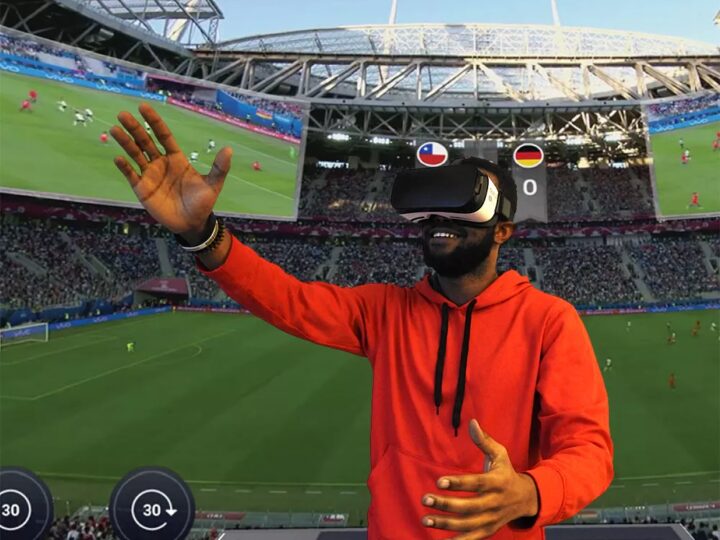
Learning objectives
- Ability to evaluate the value proposition of OTT distribution vs traditional broadcast model
- Follow a systematic approach to conduct market research
- Understand how to define, design, and monetise an OTT offering across devices/platforms
- Assess the organisational change required (process, systems, staff) to move to an OTT model and develop an Organisational Readiness Transition Plan
Course duration: 2 days
Attendee number: 20
Attendees: Broadcasters/Broadcasting Organisations and Sporting Associations
Note : This course is aimed at professionals in the broadcasting industry or are familiar with the basics of broadcasting.
The session will explain the changing face of digital media and gives you the tool to evaluate and select the most effective OTT strategies for TV content.
Course content
Part 1: Evaluate the value of an OTT offering
- Review traditional broadcast model, monetisation tactics, and future projections
- Review Case Studies of various OTT offerings
- Market research strategies to better understand existing consumers, evaluate future markets, device/platform usage, and monetisation opportunities
- Legal requirements and considerations
- Technical review of current OTT solutions and key features to consider
- Define business requirements and goals
- Build or Buy?
- Change Management strategies to prepare the executive and strategic team for the transition to an OTT offering
Part 2: Building, deploying, and managing an OTT offering
- Defining budgets and staffing plans
- Key OTT-related Vendors & Vendor Management Strategies
- How to build an RFP, evaluate bidders, and choose a solution
- Building a cross functional steering committee
- Redefining the customer experience & feedback loop
- Content Strategy across multiple segments
- Establishing key KPI and reporting solutions across the company
- Project Management tools to help prepare for launch
- Customer Support
- Culture change management
By the end of the course, participants will be able to:
- Understand OTT media
- Be able to evaluate and select OTT solutions
- Be able to create an OTT content strategy and oversee its implementation
FAN ENGAGEMENT
This course/document provides an overview of Fan Engagement Strategies and Considerations.
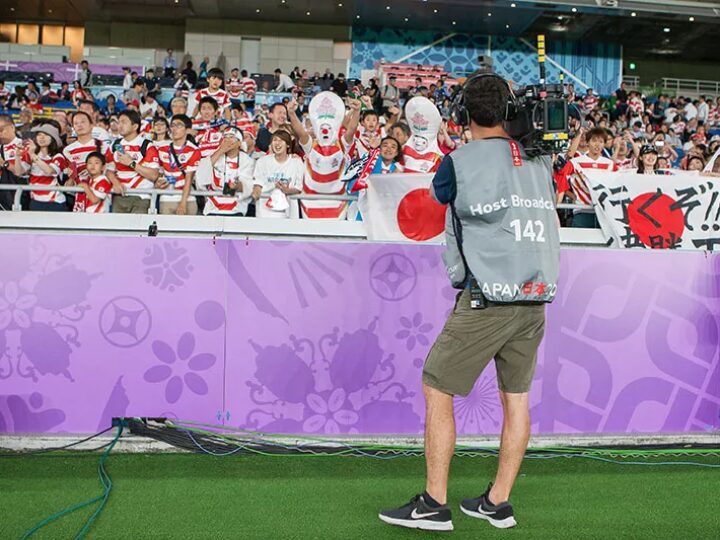
Learning objectives
- Overview of the digital media landscape and consumer behaviour
- Follow a systematic approach to conduct market research
- Understand how to increase engagement with your brand
- 360 view of the customer and CRM solutions
Course duration: 2 days
Attendee number: 20
Attendees: Broadcasters/Broadcasting Organisations and Sporting Associations
Note : This course is aimed at professionals in the broadcasting industry or those familiar with the basics of broadcasting.
The session will explain the techniques of Fan Engagement and strategies to retain loyal customers and acquire new customers through digital media.
Course content
- Review of the current digital media landscape – digital rights, distribution methods
- Analysis of consumer behaviour across digital products and platforms
- Review Case Studies of various Fan Engagement strategies
- Market research strategies to better understand existing consumers, evaluate future markets, device/platform usage, and monetisation opportunities
- Technical review of current out of the box solutions
- Define business requirements and goals
- Content Strategy
- Loyalty Programs
- Gamification
- Marketing strategies to increase awareness and generate engagement
- Quantifying and monetising fan engagement
- Building a 360 view of the customer and value of personalisation
- Overview of CRM solutions and implementation recommendations
By the end of the course, participants will be able to:
- Understand digital rights and distribution
- Be able to create fan engagement strategies
- Be able to build customer-centric approach to deliver content
PLANNING AND ORGANISING THE HOST BROADCASTING OF AN INTERNATIONAL EVENT
HBS is a high-quality broadcast service company and is privileged to be the Host Broadcaster of the FIFA World Cup™ since 2002, as well as international events such as the Asian Games and the Southeast Asian Games 2015. HBS has worked with the best international events and brings the experience of preparing and managing the broadcast requirements of an international sports event.
Whether you are an organising committee, a sports federation or a national or international sports institution, the Broadcast Academy is able to help you in the creation, preparation and organisation of a tailor-made broadcast plan. Our turnkey workshops are designed to offer guidance on the following topics:
- How to create a production plan and conduct quality control checks
- Preparing the operational plan for the venues
- Decision-making on broadcast servicing for the rights holders
- Designing and building the IBC and ensuring perfect logistics
- Engineering of broadcasting equipment to integrate with existing infrastructure
- Managing media at the event
- Recruiting, training and integrating staff
- Monitoring of broadcast operations
The workshops make use of live events as case studies to educate the participants about all the various elements required to be ready to host an international event.
INTERNATIONAL BROADCAST CENTRE (IBC) – PLANNING AND MANAGING
An International Broadcast Centre is the heart of the host broadcast operation and is the centre of television, radio, mobile and new media operations for the event, serving as the telecommunications hub for all national and international connectivity. Placed between venues and rights holders home operations the IBC is both a central component of the host broadcast operations and key component of the rights holders’ operation.
Since 1998, HBS experts have been involved in design and operation of more than 10 International Broadcast Centres including 4 major IBC’s built for FIFA World Cups™.
The Broadcast Academy by HBS will cover all aspects of an IBC for the benefit of the host broadcaster and the right holders.




